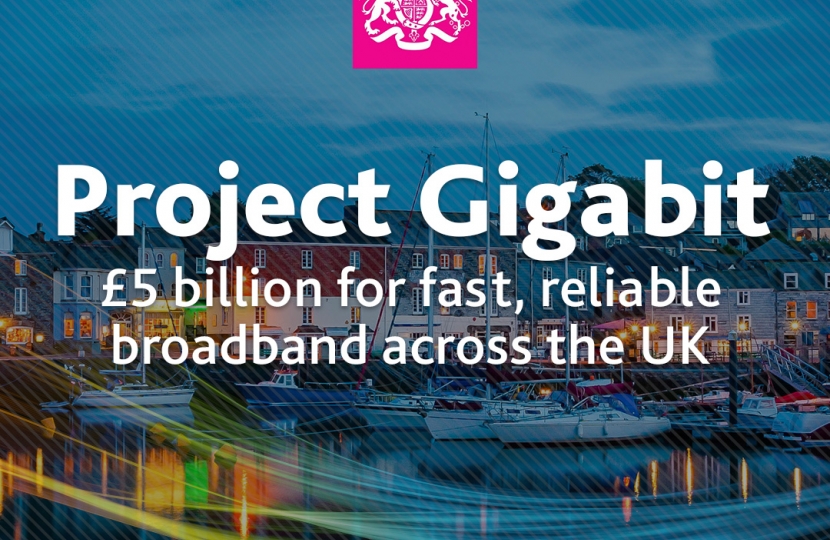
- Cumbria set to be one of the first areas to benefit from £5bn government funding for fastest broadband connections to help recovery from the pandemic, growth and levelling up
- Extra £210m worth of vouchers released to help those with slow speeds
- £110m to connect up to 7,000 rural GP surgeries, libraries and schools
- Call for evidence on using satellite and 5G technology to connect very hard to reach areas
More than one million hard to reach homes and businesses will have next generation gigabit broadband built to them in the first phase of a £5 billion government infrastructure project.
Dr Neil Hudson, MP for Penrith and The Border, has welcomed that up to 510,000 homes and businesses in Cumbria , Northumberland, Cambridgeshire, Cornwall, , Dorset, Durham, Essex, South Tyneside and Tees Valley will be the first to benefit as part of ‘Project Gigabit’.
Their available speeds will rocket to more than 1,000 megabits or one gigabit per second. It means families no longer having to battle over bandwidth and will give people in rural areas the freedom to live and work more flexibly. Contracts for these first areas will go to tender in the spring with spades in the ground in the first half of 2022.
The government-funded projects will prioritise areas that currently have slow connections and which would otherwise have been left behind in broadband companies’ rollout plans.
Gigabit broadband is being rolled out rapidly - from one in ten households in 2019 to almost two in five today. The UK is on track for one of the fastest rollouts in Europe and for half of all households to have access to gigabit speeds by the end of this year.
Project Gigabit will accelerate our recovery from covid, fire up high growth sectors like tech and the creative industries and level up the country, spreading wealth and creating jobs the breadth of Britain.
The successful Gigabit Broadband Voucher Scheme is also being relaunched with up to £210 million to give people in eligible rural areas immediate financial help to get gigabit speeds.
On top of this the government is making up to £110 million available to connect public sector buildings - such as GP surgeries, libraries and schools - in the hardest to reach parts of the UK with this revolutionary infrastructure.
Gigabit Broadband Voucher Scheme
For rural homes and businesses across the UK currently struggling with slow broadband speeds, the government is investing up to £210 million to build on the success of its Gigabit Broadband Voucher Scheme.
Launched in March 2018, the scheme provided eligible areas across the UK with vouchers to cover the installation costs of bringing gigabit connectivity to people’s homes and businesses. So far more than 66,000 vouchers worth up to £127 million have been issued to premises across the UK.
The new vouchers worth up to £1,500 for residents and up to £3,500 for businesses will go live on 8 April 2021 and mean that rural areas will not have to wait for supplier contracts under Project Gigabit to reach them.
There will be a new online postcode checker available so people can check if their home or business is eligible for a voucher.
Public sector buildings
Project Gigabit will invest up to £110 million to connect public buildings such as rural schools, doctors’ surgeries and libraries to gigabit broadband. This will help GPs provide remote video consultations and allow whole classes of schoolchildren to be online at once with no interruptions.
The government wants to connect up to 7,000 rural public buildings in order to improve public services. They will act as hubs to get gigabit-capable networks into the heart of countryside communities and incentivise other broadband companies to build off them.
The Department for Digital, Culture Media and Sport (DCMS) continues to engage with local bodies and government departments to identify suitable projects, and expects the first of these to be progressed this summer.
Very Hard to Reach Areas - Call for evidence
The UK has some very remote places that may be too expensive to build a gigabit-capable broadband network to, even with substantial public subsidy.
Thanks to completed or pending government-funded projects, less than 0.3% of the country or less than 100,000 premises are likely to fall into this category.
For these premises, which are mainly located in remote and isolated locations in Scotland and Wales, and some National Parks in England, a call for evidence has been launched to explore the barriers to improving their broadband and how innovative new technologies might help change this.
This could lead to the government encouraging industry to use new wireless equipment, low-orbit satellites or high altitude platforms to beam faster connections to far-flung homes and businesses.
The government has already made investments in wireless, satellite and hybrid-fibre technologies, and continues to explore emerging technologies in this area. Some of these technologies are also gigabit-capable and eligible for UK Gigabit Programme funding today.
Dr Hudson commented:
“I am delighted with this announcement as it should play a key role in the broader strategy to reach broadband not-spots in Penrith and The Border. I was especially pleased to see that 30,000 to 50,000 premises in North and West Northumberland and East Cumbria - including Brampton and Rothbury and 60,000 to 80,000 premises in West Cumbria are set to benefit as part of the first procurements to be announced. Alongside the extension of the voucher scheme and the money in place for public buildings we will see coverage improve in our region.
As part of my ongoing ‘Better Connectivity’ campaign I have been raising this issue repeatedly with Ministers, including the Digital Minister and also the Prime Minister. I am so pleased they have listened to me and that rural areas like Cumbria are now very much on their radar for funding.”
Prime Minister Boris Johnson said:
“Project Gigabit is the rocket boost that we need to get lightning-fast broadband to all areas of the country. This broadband revolution will fire up people’s businesses and homes, and the vital public services that we all rely on, so we can continue to level up and build back better from this pandemic.”
Digital Secretary Oliver Dowden said:
“Project Gigabit is our national mission to plug in and power up every corner of the UK and get us gigafit for the future.
“We have already made rapid progress, with almost 40 percent of homes and businesses now able to access next-generation gigabit speeds, compared to just 9 percent in 2019. Now we are setting out our plans to invest £5 billion in remote and rural areas so that no one is left behind by the connectivity revolution.
“That means no more battling over the bandwidth, more freedom to live and work anywhere in the country, and tens of thousands of new jobs created as we deliver a game-changing infrastructure upgrade.”




